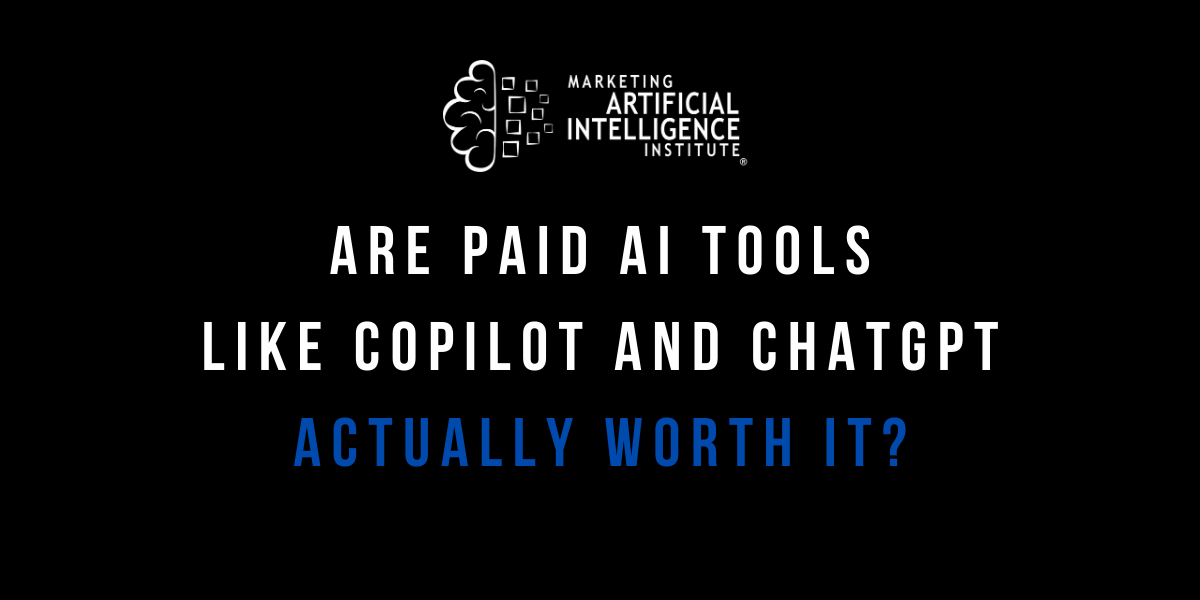Are paid AI tools like Microsoft Copilot and ChatGPT Team/Enterprise actually worth it?
Well, the math checks out:
Marketing AI Institute founder/CEO Paul Roetzer broke it down in a recent LinkedIn post…
Take an employee making $75,000/year. Assume a very conservative 10% increase in efficiency if the employee has access to “a GPT-4 level solution and has been properly trained on how to use it.”
The employee could save 17 hours per month. (Assume a full-time employee works about 2,080 hours per year, or 173 per month, based on a 40-hour workweek—making 10% time savings is about 17 hours.)
The direct savings of these 17 hours is $612 per month ($75,000 yearly for 2,080 hours comes out to about $36/hour—so 17 hours x $36 = $612.)
That seems like a pretty good deal considering Copilot and others often fall in roughly the $30/user/month range.
Says Roetzer:
“Short answer is that these AI tools, when properly integrated into companies with effective education and training, will be the greatest value in business software history.”
So, should you buy your team one or more licenses to AI tools?
Well, it’s complicated.
On Episode 82 of The Marketing AI Show, Paul broke down for me what leaders need to consider when adopting paid AI tools.
Don't Buy Team Licenses Right Away
Don’t just jump into buying team licenses right away. Enterprise vendors are only too happy to take your money.
“They want you to be buying as many licenses as possible and committing to a one-year engagement,” says Roetzer. “This is not what you should be doing.”
Take These Three Steps Instead
Don’t buy licenses just because the math works out until you’ve done three things:
- Establish generative AI policies that guide usage. “Even if they’re not perfect, you need to give your team guidelines of how to use the technology before you turn this on for them,” he says. That includes answering questions like: How are we allowed to use AI? Do we have to disclose if we use AI? What are we allowed to share with AI tools?
- Implement AI education that teaches staff how tools work and provides onboarding. You cannot just turn on AI tools for people who have no training or aren’t familiar with generative AI. Most people have only used the free version of ChatGPT and have no idea what the more powerful paid versions of AI tools are capable of. “If you’re not using the more advanced versions of these tools, then you have a misperception of where we are with this technology,” says Roetzer.
- Have someone who owns the rollout, training, and oversight of the program. “If no one is making sure that it’s being utilized, then there’s no value in it,” says Roetzer.
Then Begin Piloting AI Tools
Once you’ve done these three things, start with a pilot program.
The program should include a small number of users who are trained to use AI the right way, with guidance and oversight. It should have measurement in place, so you can gauge effectiveness before you buy the tool for the entire team.
The owners of pilot programs—and wider AI efforts—should be people who understand the internal workings of the organization. They should also be able to learn the AI products themselves and work with vendors during rollout.
This presents an exciting opportunity for forward-thinking professionals:
If you’re on the frontier of AI, you can become the champion within your organization. You may even develop your own title and career path in an AI ops role or generative AI management role in your organization.
Mike Kaput
As Chief Content Officer, Mike Kaput uses content marketing, marketing strategy, and marketing technology to grow and scale traffic, leads, and revenue for Marketing AI Institute. Mike is the co-author of Marketing Artificial Intelligence: AI, Marketing and the Future of Business (Matt Holt Books, 2022). See Mike's full bio.



